August is a quiet month on the literary calendar, though it does contain National Bookshop Day – or, as it is now called Love Your Bookshop Day. I do hope you showed your favourite bookshop some love.
August figures
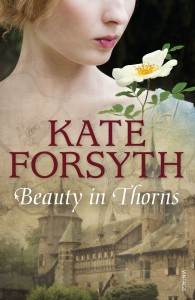 Our Classics and Literary reviewing stats continue to boom, with no bust yet in sight. Woo hoo! Last year, we had just 20 reviews in August, but this year we had 53!! Here are some of the highlights:
Our Classics and Literary reviewing stats continue to boom, with no bust yet in sight. Woo hoo! Last year, we had just 20 reviews in August, but this year we had 53!! Here are some of the highlights:
- Our most reviewed author this month was also last month’s: Kate Forsyth for her keenly awaited Beauty in thorns (4 reviews). She was closely followed by Sofie Laguna, reviewed three times (for The choke and One foot wrong) and Rachel Leary’s Bridget Crack, also reviewed three times.
- Top reviewer this month was someone who’s appeared in this slot a few times this year, GoodReads reviewer calzean, with five reviews. She was closely followed by Theresa Smith (Theresa Smith Writes) and Bill Holloway (The Australian Legend) with four reviews.
- I’m thrilled that this month Classics shone, with NINE reviews posted. Go team. It’s lovely seeing our readers taking an interest in our older works.
The Classics
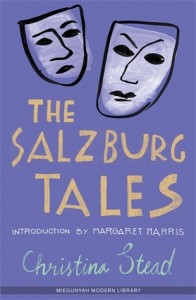 So, as always, I’m starting with the Classics. With 9 reviews, I can’t share them all, but I do need to share the one that was reviewed twice – by Bill (The Australian Legend) and Brona (Brona’s Books). It’s Christina Stead’s The Salzburg tales, and is a collection of stories told by visitors to, yes, Salzburg. Bill writes:
So, as always, I’m starting with the Classics. With 9 reviews, I can’t share them all, but I do need to share the one that was reviewed twice – by Bill (The Australian Legend) and Brona (Brona’s Books). It’s Christina Stead’s The Salzburg tales, and is a collection of stories told by visitors to, yes, Salzburg. Bill writes:
We know that Stead is a wonderful writer, but the virtuosity of these tales with all their different styles and settings is amazing. And Stead’s daring in making her first published work a take on The Canterbury Tales, one of English literature’s earliest and best-known works, is breathtaking.
Bill liked the book, though does say it’s one to read over a period of time. Brona, on the other hand, didn’t love the book, not because it’s not good, she said, but because it’s not the sort of book she likes reading:
The thing I missed most whilst reading this book though, was character development.
I realised that I much prefer books with interesting, engaging, evolving characters. Characters that I can get inside of who have complex, nuanced behaviours. I want to be able to walk around in their skin for a while; to see things from another perspective.
Stead’s Tales provided entertainment to my intellectual self, but most of them failed to touch my heart or soul.
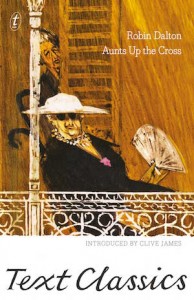 The next one I want to share is Robin Dalton’s Aunts up the Cross, partly because I want to make the point that classics don’t have to be fiction. It’s a memoir, and Calzean reviewed it. Unlike many who have read it here, she didn’t love it, but she did appreciate that it’s “about a distinct time and place in Australian history.” This, as much as for any reason, is why I want to read it.
The next one I want to share is Robin Dalton’s Aunts up the Cross, partly because I want to make the point that classics don’t have to be fiction. It’s a memoir, and Calzean reviewed it. Unlike many who have read it here, she didn’t love it, but she did appreciate that it’s “about a distinct time and place in Australian history.” This, as much as for any reason, is why I want to read it.
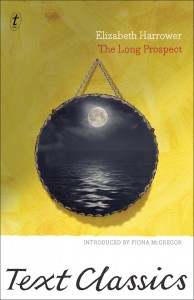 That’s three reviews, for two books. I’ll choose just one more, Kim’s (Reading Matters) review of the wonderful Elizabeth Harrower’s The long prospect. First published in 1958, it was Harrower’s second novel. Kim describes it as “a powerful example of Australian postwar literature”. She found it a bit slow to get into, but sees Harrower as one of Australia’s most important writers. She says that in this book, Harrower is
That’s three reviews, for two books. I’ll choose just one more, Kim’s (Reading Matters) review of the wonderful Elizabeth Harrower’s The long prospect. First published in 1958, it was Harrower’s second novel. Kim describes it as “a powerful example of Australian postwar literature”. She found it a bit slow to get into, but sees Harrower as one of Australia’s most important writers. She says that in this book, Harrower is
incredibly perceptive about the psychology of people and what makes various “types” tick (especially prepubescent girls, in this case), and her dialogue, complete with barbed comments and little cruelties, is brilliantly believable.
Have any of these convinced you to give some classics a go?
Short stories
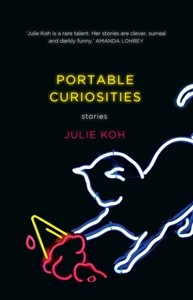 We do have the occasional short story round-up, but that focuses on ALL short stories, whereas here I only see those collections an anthologies identified as literary. We had a good number, 6, this month. Two, Stead’s Salzburg tales, I’ve covered under Classics, and that leaves us four reviews for three books. I may as well do them all.
We do have the occasional short story round-up, but that focuses on ALL short stories, whereas here I only see those collections an anthologies identified as literary. We had a good number, 6, this month. Two, Stead’s Salzburg tales, I’ve covered under Classics, and that leaves us four reviews for three books. I may as well do them all.
The other book receiving two reviews was Julie Koh’s Portable curiosities. It was reviewed by Ashleigh Kalagian Blunt (Newtown Review of Books) and Jemma (Oddfeather Creative). Blunt tells us that this is Koh’s debut full-length short story collection, but follows her “capsule collection Capital Misfits” which resulted in her being named one of 2017’s Sydney Morning Herald Young Novelists of the Year. The stories are, says Blunt, surreal but grounded, and cover a wide variety of topics. She liked it, saying that “Koh has achieved a distinctive writing voice and produced an engaging, thought-provoking collection.” Jemma was similarly intrigued concluding:
Her writing is modern magic realism, updated myth-making, and caustic satire wrapped in imagination and introspection. Expect to be changed at least a little from reading these stories, and try not to read them before bed; your dreams will never be the same.
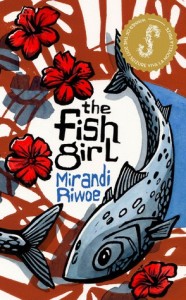 The two books which received one review each were Mirandi Riwoe’s The fish girl and Karenlee Thompson’s Flame tip. Kali Napier reviewed The fish girl. She classified it as “short stories” but it’s actually a novella, and was joint winner of the reputable Seizure Novella Prize. The story was apparently inspired by “the reference to a ‘Malay trollop’ in W. Somerset Maugham’s story, ‘The Four Dutchmen'”. The girl in Riwoe’s story is Mina who “leaves her village and the innocence of her mother’s home to work in the kitchen of a Dutch colonial.” The result, as you probably expect, is not a positive one for Mina who becomes the property of her master.
The two books which received one review each were Mirandi Riwoe’s The fish girl and Karenlee Thompson’s Flame tip. Kali Napier reviewed The fish girl. She classified it as “short stories” but it’s actually a novella, and was joint winner of the reputable Seizure Novella Prize. The story was apparently inspired by “the reference to a ‘Malay trollop’ in W. Somerset Maugham’s story, ‘The Four Dutchmen'”. The girl in Riwoe’s story is Mina who “leaves her village and the innocence of her mother’s home to work in the kitchen of a Dutch colonial.” The result, as you probably expect, is not a positive one for Mina who becomes the property of her master.
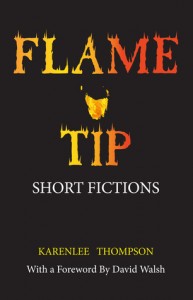 By contrast, Karenlee Thompson’s Flame tip is a collection, but one comprising what she calls short fictions, all of which were inspired by the Tasmanian fires of 1967. I reviewed it, and wrote:
By contrast, Karenlee Thompson’s Flame tip is a collection, but one comprising what she calls short fictions, all of which were inspired by the Tasmanian fires of 1967. I reviewed it, and wrote:
The book is subtitled “short fictions”, and Thompson describes it as a collection of “creative writing pieces”. In other words, the term “short stories” isn’t used. There are “traditional” short stories here, but the collection also includes other “pieces”. There’s the shape poem “Flame”, an epistolary story (“Love, what is thy name”), and the piece titled “Lost” which riffs on lost-and-found ads.
Although a book inspired by fire sounds grim – and there is grimness here – Thompson varies the tone and form enough to produce a collection that conveys devastation, as it must, without dragging you down.
New releases
Here, from our new releases page, are some that upcoming books which might interest literary fiction readers:
- Cheyenne Blue’s Party Wall (Ylva Publishing) which is set on Queensland Central Coast. Blue has been a finalist for the Lambda Literary Award and the Golden Crown Literary Award. Her area seems to be primarily lesbian erotica.
- Catherine Cole’s Seabirds crying in the harbour dark (UWA Publishing) which our releases page describes as being “about seeking refuge, about how we define home and what makes us feel safe.”
- Lois Murphy’s Soon (Transit Lounge), a debut literary thriller which won the University of Tasmania prize for “best new unpublished literary work by an emerging Tasmanian writer”.
- Tracy Sorensen’s The lucky galah (Picador), a debut novel which our page describes as “Madame Bovary with red dust and tropical cyclone Steve”.
We have no advanced reviews for any of these books, so would love to see some in our September round-ups.
———————
About Me
I am Whispering Gums and I read, review and blog about (mostly) literary fiction. It was reading Jane Austen when I was 14 years old that turned me on to reading literary fiction/classics, which is why I am here today doing this round-up! Little did Jane know what she started!
My love of Aussie literature started with Banjo Paterson’s ballads and Ethel Turner’s Seven Little Australians in my childhood. But, I didn’t really discover Australian women’s writing until the 1980s when I “met” and fell in love with Elizabeth Jolley, Thea Astley, Olga Masters, Helen Garner and Kate Grenville. Ever since then I have been making sure to include a good percentage of Australian (and other) women writers in my reading diet.






Great wrap-up. But how many challenges in August 😉
Thanks Tracey. Fair point re challenges, though I reckon that if I went down that path I’d never come out the other end! (BUT, apologies for the xx instead of a real figure for last August. I forgot to go back and check. It’s there now 😁👍)
I only classified The Fish Girl as ‘short stories’ because there is no ‘novella’ option!
Thanks very much Kali. I understand, and it’s no biggie. I just wanted readers to know that this is a Novella not a collection of Short Stories. In future, you can just type in Novella under Other, rather than tick Short Stories. I’ll do that now behind the scenes if that’s OK with you?